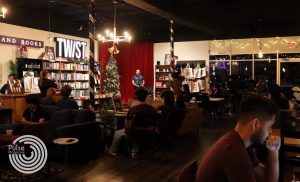Education is power
The echoing cries of frustration and the yearning for a new awakening has caused an uproar across the nation. In the wake of frequent police brutality incidents towards Black Americans, racial justice protests continue to break out on the streets, and communities continue to join the movement to dismantle systemic racism. A group of six McAllen Independent School District alumni created the Grande Narrative to fight for racial justice through Black history education. The narrative is on a mission to create positive conversations surrounding race across the Rio Grande Valley and Texas schools.
Including Black history into a school’s curriculum is not a national requirement. Only a few states acknowledge the role of Black history and its pivotal role in America’s development. Most state standards will only teach students the critical turning points in American history such as the superficialities of slavery, violence and the civil rights movement. The Grande Narrative strives to institutionalize a deeper emphasis of Black history into schools’ core curricula, demonstrating its importance on the discovery and growth of the United States.
“We want to be able to impact the curriculum,” Frida Retana said. Retana is one out of six co-founders of the Grande Narrative. She graduated from Nikki Rowe High School and is currently a junior at the University of Texas Rio Grande Valley.
“A lot of times, we don’t learn about Black contributions to society. I feel like we often miss those types of subjects in school,” Retana said.
In April, the State Board of Education gave their final approval to adopt an African American Studies elective course for high school students through Texas Essential Knowledge and Skills (TEKS), a statewide curriculum standard outlining what students learn in each course or grade level. While Texas is the fifth state in the US to approve of a state-level African American Studies course, the course is limited to only high school students and it is not required. The narrative emphasizes its goal for schools to require its students to be reading from Black authors, not only within history, but ideally within all school subjects to showcase Black contributions and gain a broader perspective and insight.
“I feel like there is a lot of ignorance that we can change,” Retana said.
The Grande Narrative was established in July after people were becoming more informed about racism through the anti-racist lens of the Black Lives Matter movement.
“We thought education would be a feasible way to start effecting change,” Jessenia Herzberg said.
Herzberg is the second co-founder of the Grande Narrative. She graduated from McAllen High School and is currently a senior at St. Edwards University. “We [the six co-founders] talked about our educational experiences,” Herzberg said.
The co-founders discovered that although they each graduated from different MISD high schools, they all shared one common thing: they each missed out on a more diverse curriculum. The founders of the narrative started a petition and regularly meet with McAllen ISD school board members to develop the narrative along the way.
In June, during the breakout of protests across the nation, Daniel Pena of the Rio Grande Valley, raged and intimidated Black Lives Matter protesters with a chainsaw in downtown McAllen. The local incident made national news and pushed the narrative to do something to prevent another incident from occurring.
“No one is born racist, this is something people learn,” Herzberg said. “People really don’t think racism exists in the Valley. Even if they don’t, it’s still here. There’s a general anti-Blackness within the Latinx community,” Herzberg said. “We should be doing something about it.”
Latifah Khuffash, the third co-founder of the Grande Narrative, recalls witnessing anti-Blackness firsthand in school. Khuffash also graduated from Nikki Rowe High School and is currently a junior at the University of Texas Rio Grande Valley.
“In class, racial slurs would be thrown around a lot,” Khuffash said. She believes this is very prominent in American public schools. “Very little teachers would stop the students saying it. They [the teachers] thought it was normal,” Khuffash said.
This type of ignorance is not new, but it challenges the narrative and its co-founders to raise students’ awareness of other cultures, such as Black culture, to enhance appreciation and compassion for the culture and to prevent racism.
Natalie Glasper, the fourth co-founder of the Grande Narrative, graduated from McAllen Memorial High School and is currently a junior at Baylor University. Glasper was motivated to be a part of the narrative after realizing her own true historical roots were not being taught in schools across the valley.
“I felt like there was a lack of representation for Black history in the Valley,” Glasper said. “It personally made me feel left out.” According to Glasper, McAllen ISD has a diverse community. She has an interest in learning about Black curricula and believes others would find interest in learning about it as well.
The Grande Narrative created a collaborative comprehensive guide of Black history resources for grade levels 1st through 12th. The guide includes recommended lesson plans, activities, discussions, books, movies and documentaries for students and teachers to engage with. The narrative’s compiled list of resources stemmed from researching what other schools are currently doing to teach more Black history into schools. Some of these plans include looking at race and racial identity in children’s books; representations of major events such as the birth of the Black power movement, the civil rights movement, the Harlem Renaissance, the Montgomery bus boycott, the Voting Rights Act; and Black History in the RGV.
“I just learned that the Underground Railroad was down here [in the RGV] as well,” Herzberg said.
During the mid-1800s, the abolitionist movement emerged as a social and radicalized effort to put an immediate end to slavery. During this movement, the Underground Railroad served as an aid to help slaves escape from states like Kentucky, Maryland, and Virginia, and liberate many of the enslaved people to northward states or Canada. However, the Underground Railroad served its purpose to also help slaves flee southward to Mexico. The Jacksons and the Webbers, two biracial families of white husbands and their emancipated Black wives, helped many Black slaves escape to Mexico. Both families’ and their ranches represent the Rio Grande Valley’s part in the Underground Railroad. Their ranches, now known as the Eli Jackson Methodist Church and cemetery in San Juan, once served as a final stop for slaves before they stepped foot into Mexico and looked forward to their path of lifelong freedom.
“The Underground Railroad incorporates Afro-Latino identity. This is not something that is talked about a lot in schools,” Herzberg said. “This [the Underground Railroad] can relate to our large Latinx community in the valley.”
The Grande Narrative frequently meets with McAllen ISD school board members to receive help and advice on moving forward.
“The school board has helped us bring this to the attention of the superintendent,” Glasper said. “We are probably going to have to take this to a state level because of the lack of control we have at a local level. Essentially, we hope to expand across the Valley and other districts in Texas.”
The narrative is trying to get more support from parents and teachers to continue bridging the gap with the Black community and Black history education. To get involved, the Grande Narrative encourages folks to speak at a school board meeting, email teachers, or email school board members for support. To start a chapter, the Grande Narrative has a roadmap to prepare, launch and proceed with continuous action. For more information and resources, the narrative can be found on Facebook, Instagram, and email at thegrandenarrative@gmail.com.
Note: Shaena Reyes and Lorena Houghton are the other two co-founders of the Grande Narrative. They were not available for an interview during this time.





